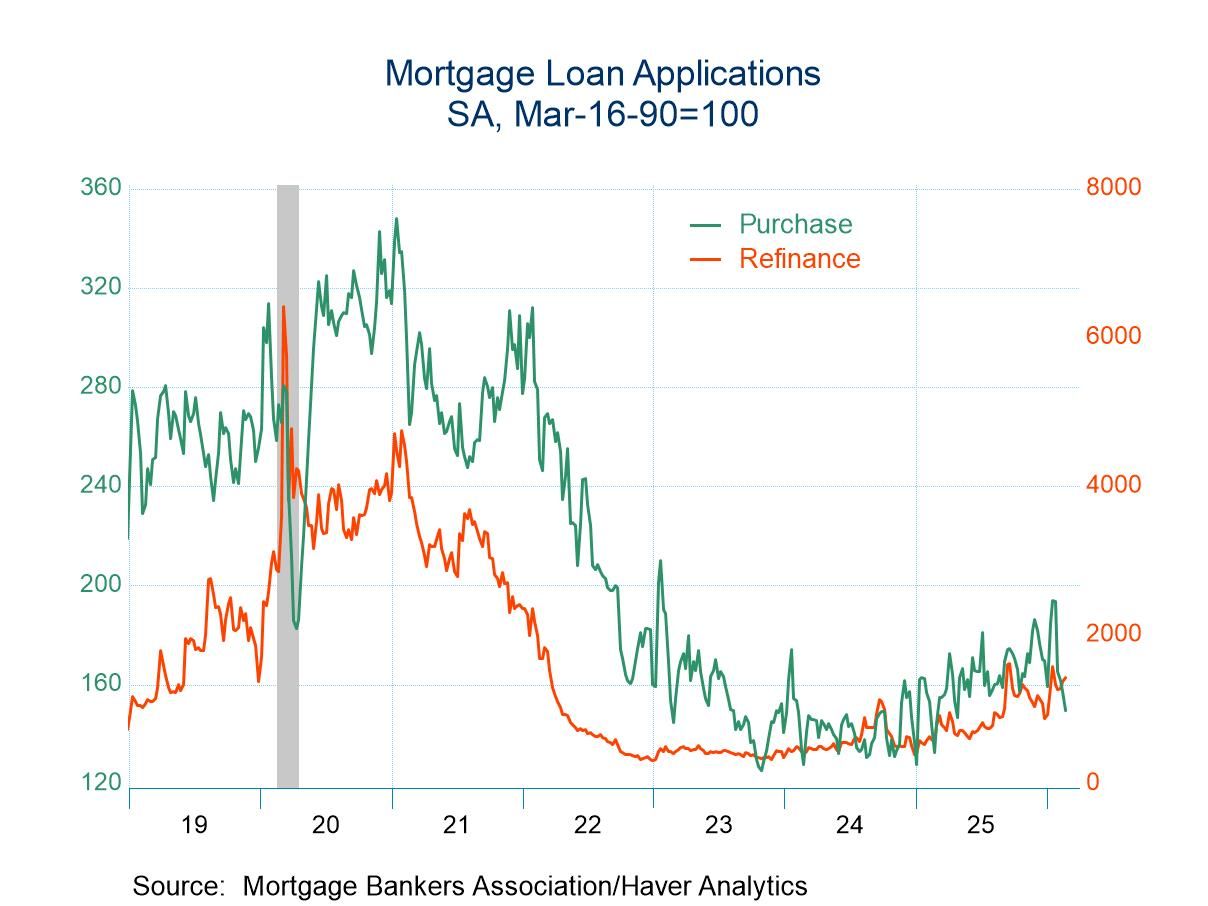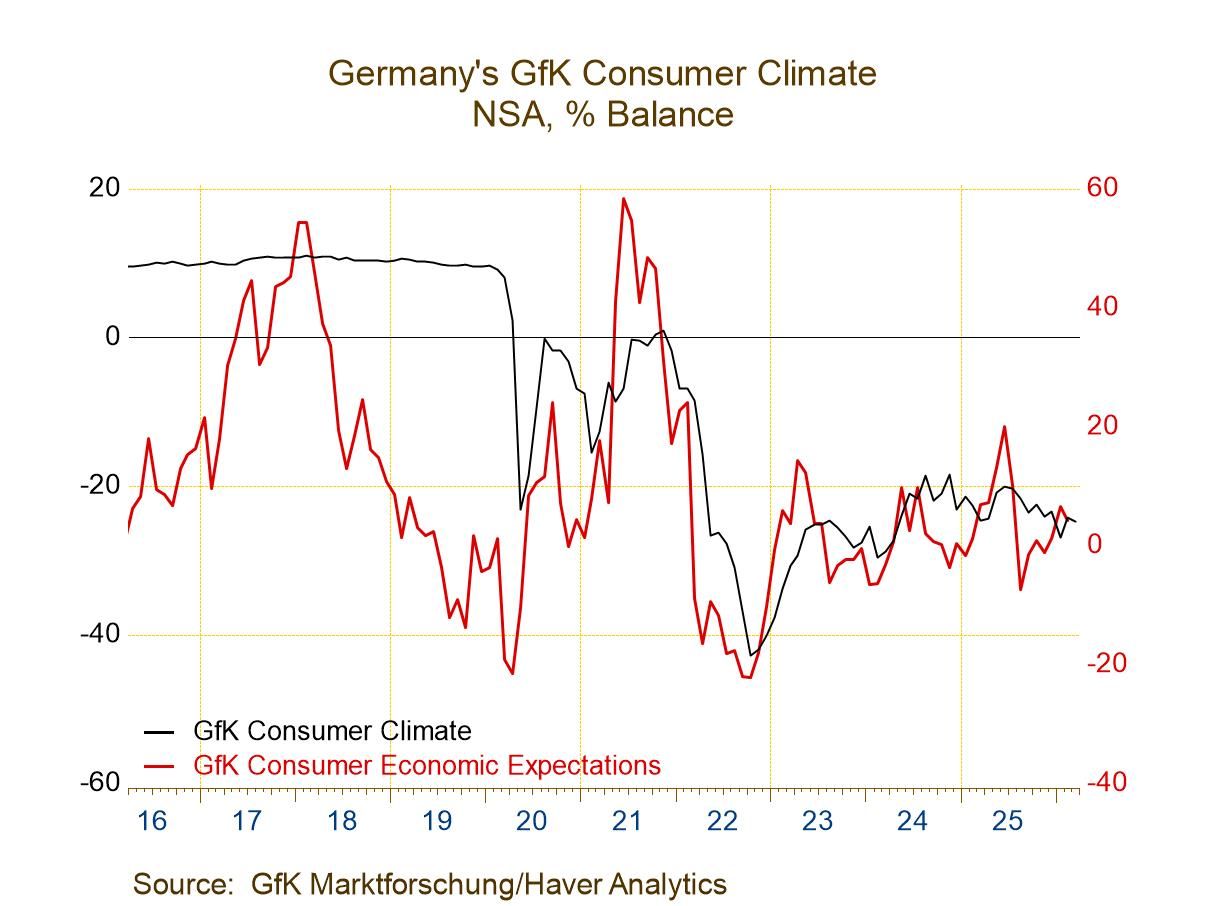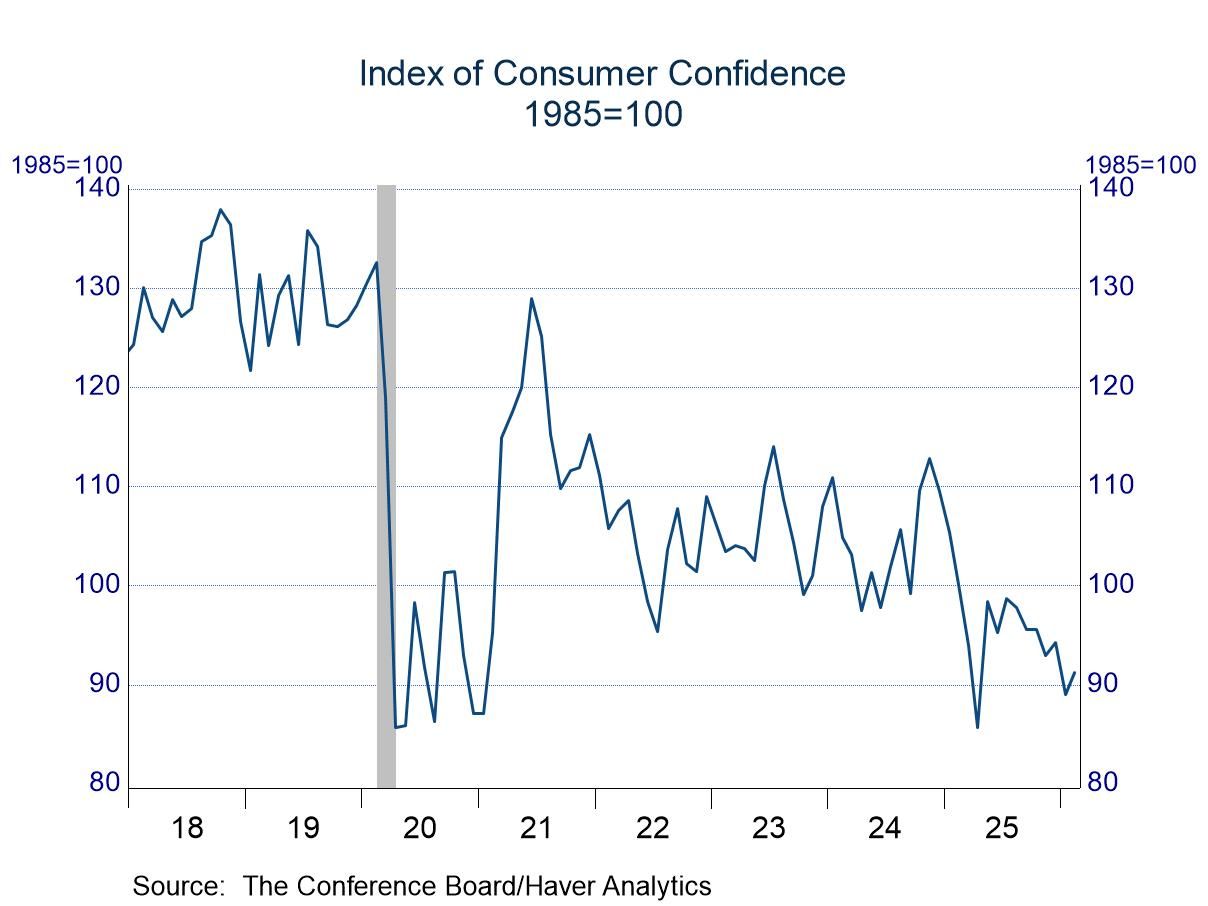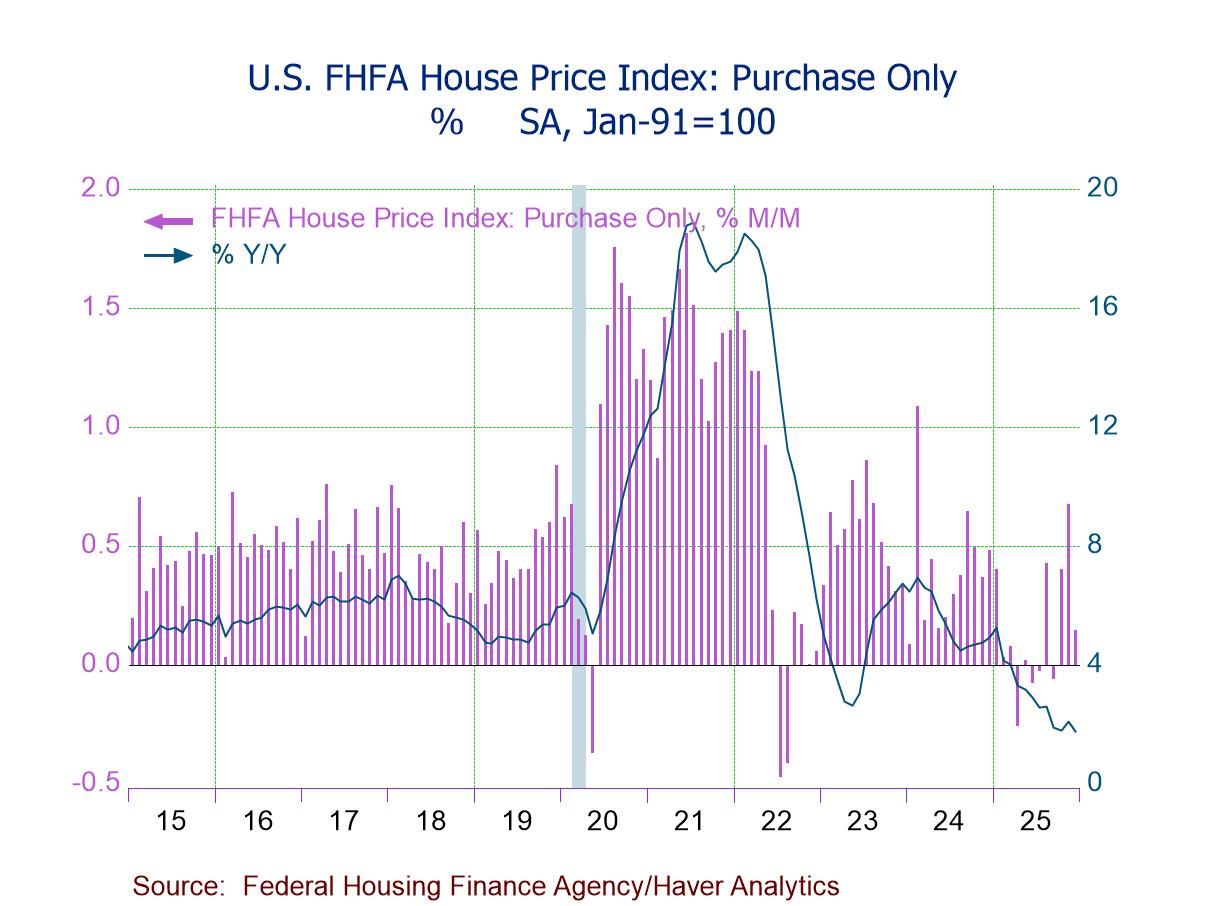 Global| Sep 21 2009
Global| Sep 21 2009U.S. Leading Indicators Rise For A Fifth Straight Month And Signal Economic Recovery
by:Tom Moeller
|in:Economy in Brief
Summary
The Conference Board's Index of Leading Economic Indicators continued to suggest a pending economic recovery with a 0.6% August increase that was close to expectations. The rise in the composite index of leaders was the fifth in a row [...]
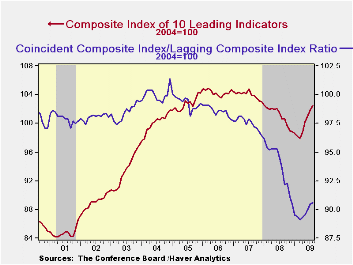 The
Conference Board's Index of Leading Economic Indicators continued to
suggest a pending economic recovery with a 0.6% August increase that
was close to expectations. The rise in the composite index of leaders
was the fifth in a row and the 4.7% increase during those five months
was the strongest since early-1983. The index itself was at the highest
level since January of last year. The leading index is based on actual
reports for eight economic data series. The Conference Board initially
estimates two series, orders for consumer goods and orders for capital
goods.
The
Conference Board's Index of Leading Economic Indicators continued to
suggest a pending economic recovery with a 0.6% August increase that
was close to expectations. The rise in the composite index of leaders
was the fifth in a row and the 4.7% increase during those five months
was the strongest since early-1983. The index itself was at the highest
level since January of last year. The leading index is based on actual
reports for eight economic data series. The Conference Board initially
estimates two series, orders for consumer goods and orders for capital
goods.
Perhaps tempering the outlook was that the 0.6% August increase in the leaders was the weakest of the last five months. Moreover, a slightly diminished 60% of the index components rose. Higher stock prices and a steeper interest rate yield curve, along with a slower speed of vendor deliveries, made the largest positive contributions to the latest overall increase in the leaders. However, the real money supply fell for the fourth month in the last five and average weekly factory hours worked were unchanged as were new orders for consumer goods & materials.
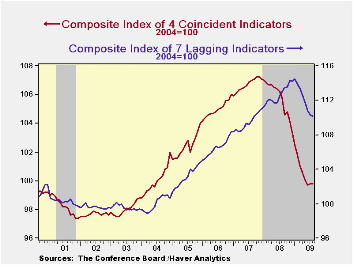 Continuing to
suggest that the rate of decline in the economy is slowing were the
coincident indicators. They were unchanged during August after a slim
0.1% July gain. While hardly indicative of a robust economy, these
declines compare with monthly shortfalls of 0.6%-to-1.1% dating back to
September. Fostering the turnaround have been slight increases in
industrial production and real personal income as well as diminished
monthly declines in payrolls.
Continuing to
suggest that the rate of decline in the economy is slowing were the
coincident indicators. They were unchanged during August after a slim
0.1% July gain. While hardly indicative of a robust economy, these
declines compare with monthly shortfalls of 0.6%-to-1.1% dating back to
September. Fostering the turnaround have been slight increases in
industrial production and real personal income as well as diminished
monthly declines in payrolls.
Wringing out past economic
excesses is needed for real economic recovery. In a further sign that
excesses in the U.S. economy are diminishing, the lagging index fell
for the eight month in the last nine. To that point, C&I loans
outstanding fell sharply for the ninth straight month and consumer
credit versus personal income was off for the fifth month this year.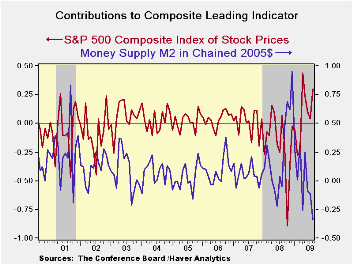 Regardless, the average duration of unemployment shortened and the
change in CPI for services eased. The ratio of coincident-to-lagging
indicators (a measure of economic excess) also continued higher for the
fifth straight month to the highest level since November.
Regardless, the average duration of unemployment shortened and the
change in CPI for services eased. The ratio of coincident-to-lagging
indicators (a measure of economic excess) also continued higher for the
fifth straight month to the highest level since November.
The Conference Board figures are available in Haver's BCI database. Visit the Conference Board's site for coverage of leading indicator series from around the world.
Beyond Inflation Targeting: Should Central Banks
Target the Price Level? from the Federal Reserve Bank
of Kansas City is available here.
How Will Unemployment Fare Following the Recession? also from the Federal Reserve Bank of Kansas City can be found here.
| Business Cycle Indicators (%) | August | July | June | May 6-Month % (AR) | 2008 | 2007 | 2006 |
|---|---|---|---|---|---|---|---|
| Leading | 0.6 | 0.9 | 0.8 | 6.2 | -2.8 | -0.3 | 1.5 |
| Coincident | 0.0 | 0.1 | -0.4 | -5.4 | -0.9 | 1.6 | 2.5 |
| Lagging | -0.1 | -0.5 | -0.9 | -8.6 | 2.9 | 2.8 | 3.3 |
Tom Moeller
AuthorMore in Author Profile »Prior to joining Haver Analytics in 2000, Mr. Moeller worked as the Economist at Chancellor Capital Management from 1985 to 1999. There, he developed comprehensive economic forecasts and interpreted economic data for equity and fixed income portfolio managers. Also at Chancellor, Mr. Moeller worked as an equity analyst and was responsible for researching and rating companies in the economically sensitive automobile and housing industries for investment in Chancellor’s equity portfolio. Prior to joining Chancellor, Mr. Moeller was an Economist at Citibank from 1979 to 1984. He also analyzed pricing behavior in the metals industry for the Council on Wage and Price Stability in Washington, D.C. In 1999, Mr. Moeller received the award for most accurate forecast from the Forecasters' Club of New York. From 1990 to 1992 he was President of the New York Association for Business Economists. Mr. Moeller earned an M.B.A. in Finance from Fordham University, where he graduated in 1987. He holds a Bachelor of Arts in Economics from George Washington University.



